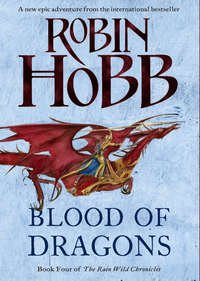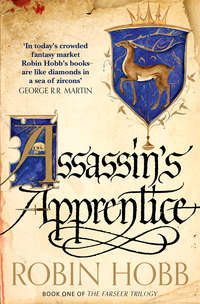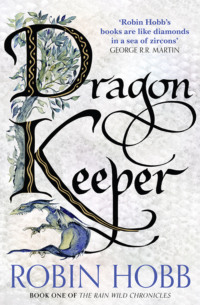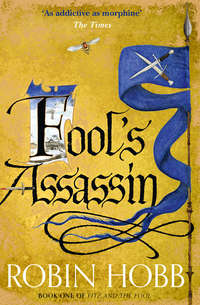
Полная версия
Ship of Magic
Her eyes almost met his. ‘I think you would care if I were not here now. As I cared when you were not here before.’
He finished another bite of the tart. ‘This is a stupid conversation. I do not care to continue it.’
‘Aye,’ she said, and he did not know if she were accepting his command, or agreeing with him. It didn’t matter. She was silent as he finished the tart. He poured another glass of the wine and leaned back with it. His mind roved back over the last few weeks, assessing all he had done. He’d been a fool, he decided. He should have put off going to the Others’ Island, and when he’d had the Others’ oracle, he’d been a fool to spout off his ambitions to his crew. Idiot. Dolt. By now he was the laughing-stock of Divvytown. He could imagine their mockery in the taverns and inns. ‘King of the Pirates’, they’d say. ‘As if we want or need a king. As if we’d have him as king, if we did want or need one.’ And they’d laugh.
Shame rose up to engulf him. He’d humiliated himself yet again, and as always it was his own fault. He was stupid, stupid, stupid, and his only hope of surviving was in not letting anyone else know how stupid he was. He sat twisting his ring on his finger and staring into the fire. He glanced once at the wizardwood charm strapped to his wrist. His own sardonic smile mocked him. Had it ever moved at all, or had it only been another trick of the Others’ magic? Going to the Others’ Island at all had been a mistake. No doubt his crew were talking that up as well, their captain seeking an oracle as if he were a barren woman or a god-struck fanatic. Why did his highest hopes always have to turn to his deepest humiliations?
‘Shall I come and rub your shoulders, Kennit?’
He turned to glare at her. Who did she think she was, to interrupt his thoughts?
‘Why do you think I’d welcome that?’ he demanded coldly.
Her voice had no inflection as she observed. ‘You looked troubled. Weary and tense.’
‘You think you can know those things by looking at me, whore?’
Her dark eyes dared to meet his. ‘A woman knows these things by looking at a man when she has looked at him often over three years.’ She rose and came to stand behind him, naked still. She set her long narrow hands to his shoulders and worked at his muscles through the thin silk of the robe. It felt so good. For a time he sat still and tolerated her touch on him. But then she began to speak as she kneaded at his knotted muscles.
‘I miss you when you are gone on these longer voyages. I wonder if you are all right. Sometimes I wonder if you are coming back at all. After all, what ties you to Divvytown? I know you care little for me. Only that I be here and behave as you wish me to. I think Bettel only keeps me on because of your preference for me. I am not… what most men would wish for. Do you see how important that makes you in my life? Without you, Bettel would turn me out of the house and I’d have to work as a freegirl. But you come here, and you ask for me by my name, and you take the finest chamber in the house for our use, and always pay in true gold. Do you know what the others here call me? Kennit’s whore.’ She gave a brief snort of bitter laughter. ‘Once I would have been shamed by that. Now I like the sound of it.’
‘Why are you talking?’ Kennit’s voice cut her musings as harshly as a blunt knife. ‘Do you think I pay to hear you talk?’
It was a question. She knew she was allowed to answer. ‘No,’ she replied in a low voice. ‘But I think that with the gold you pay Bettel, I could rent a small house for us. I would keep it tidy and clean. It would always be there for you to come home to, and I would always be ready and clean for you. I vow there would never be the smell of another man upon me.’
‘And you think I would like that?’ he scoffed.
‘I do not know,’ she said quietly. ‘I know that I would like that. That’s all.’
‘I care not at all what you would like or not like,’ he told her. He reached back to lift her hands from his shoulders. The fire had heated her skin. He rose from the chair and turned to face her. He ran a hand over her bared skin, fascinated for a time with the feel of the fire-warmed flesh. It roused him again. But when he lifted his eyes to her face, he was shocked to find tears on her cheeks. It was intolerable.
‘Go back to the bed,’ he commanded her in disgust, and she went, obedient as ever. He stood facing the fire, recalling sleek skin under his fingers and wanting to use her again, but dismayed at the thought of her wet face and teary eyes. This was not why he bought a whore. He bought a whore to avoid all this. Damn it, he had paid. He did not look at the bed as he commanded her suddenly, ‘Lie on your belly. Face down.’
He heard her shift in the sheets. He went to her quickly across the darkened room. He mounted her that way, face down like a boy, but he took her as a woman. Let no one, not even a whore, say that Kennit did not know the difference between the two.
He knew he was not unduly rough, but still she wept, even after he rolled off her. Somehow the near-noiseless weeping of the woman beside him troubled him. The disturbance he felt at it combined with his earlier shame and self-disgust. What was the matter with her? He paid her, didn’t he? What right did she have to expect any more than that from him? She was, after all, just a whore. It was the deal they had made.
Abruptly he rose and began pulling on his clothes. After a time, her weeping stopped. She turned over suddenly in the bedding. ‘Please,’ she whispered hoarsely. ‘Please don’t go. I’m sorry I displeased you. I’ll be still now. I promise.’
The hopelessness in her voice rang against the hopelessness in his heart, steel against steel. He should kill her. He should just kill her rather than let her say such words to him. Instead, he thrust his hand into his coat pocket. ‘Here, this is for you,’ he said, groping for some small coin to give her. Money would remind them both of why they were here together in this room. But fate had betrayed him, for there was nothing in his pocket. He’d left the ship in that much haste. He’d have to go back to the Marietta to get money to pay Bettel. It was all damnably embarrassing. He knew the whore was looking at him, waiting. What could be more humiliating than to stand penniless before the whore one had already used?
But there, in the smallest corner of his pocket he felt something, something tiny that jabbed him under the fingernail. He picked it loose in annoyance, a thorn or a stray pebble, and drew forth instead the tiny jewelled earring from the blue kitten’s ear. The ruby winked at him. He had never cared for rubies. It would do for Etta. ‘Here,’ he said, pushing it into her hand. He added, ‘Don’t leave the room. Keep it until tomorrow night. I’ll be back.’ He left the room before she could speak. It irked him, for he suspected Bettel would demand a small king’s ransom for keeping both room and girl occupied a full night and a day besides. Well, let her demand, he knew what he’d pay. And it would keep him from having to admit to Bettel that he had not the money to pay her tonight. At least he could avoid that shame.
He rattled down the stairs and out the door. ‘I want the room and girl kept for me, as they are,’ he informed Bettel as he passed. Another time, he might almost have enjoyed the look of consternation that brought to her face. He was well down the street before he felt his purse thudding against his hip. It was in his left pocket. Ridiculous. He never kept it there. He thought of going back and paying Bettel off right now, but decided against it. He’d only look like a fool if he went back now saying he’d changed his mind. A fool. The word burned in his mind.
He lengthened his stride to try and escape his own thoughts. He needed to be out and moving just now. As he strode down the mud-sticky street, a tiny voice spoke at his wrist. ‘That was likely the only bit of treasure ever carried off from the Others’ Island, and you gave it to a whore.’
‘So?’ he demanded, bringing the small face up to his own to stare into it.
‘So perhaps you do have both luck and wisdom.’ The tiny face smirked at him. ‘Perhaps.’
‘What mean you by that?’
But the wizardwood charm did not speak again that evening, not even when he flicked his forefinger against its face. The carved features remained as still and hard as stone.
He went to Ivro’s parlour. He did not know he was going there until he stood outside the door. It was dark within. It was far later than he’d thought. He kicked at the door until first Ivro’s son, and then Ivro yelled at him to stop.
‘It’s Kennit,’ he said into the darkness. ‘I want another tattoo.’
A feeble light was kindled inside the house. After a moment, Ivro jerked the door open. ‘Why should I waste my time?’ the small craftsman demanded furiously. ‘Take your trade elsewhere, to a dolt with some needles and ash who doesn’t give a damn about his work. Then when you have it burned off the next day, you won’t have destroyed anything worth having.’ He spat, narrowly missing Kennit’s boots. ‘I’m an artist, not a whore.’
Kennit found himself holding the man by his throat, on his toes, as he shook him back and forth. ‘I paid, damn you!’ he heard himself shouting. ‘I paid for it and I did what I wanted with it. Understand?’
He found his control as abruptly as he had lost it. Breathing hard, he set the artist back on his own feet. ‘Understand,’ he growled more softly. He saw hatred in the man’s eyes, but also fear. He would do it. He’d do it for the heavy gold that clinked in the purse Kennit showed him. Artists and whores, gold always bought them. An artist was no more than a whore who had been well paid.
‘Come in, then,’ Ivro invited him in a deadly soft voice. With a shivering up his back, Kennit knew the small man would make sure he gave him pain as well as art. But there was enough of the artist in him that Kennit knew his tattoo would also be as perfect as Ivro could contrive it. Pain and perfection. It was the only path to redemption he knew. And if ever he needed to make reparation to his luck, it was tonight. Kennit followed the man into his parlour, and unbuttoned his shirt as Ivro lit branch after branch of candles. He folded his shirt carefully and sat down on the low stool with both his shirt and his jacket across his lap. Pain and perfection. He felt a terrible anticipation of release as Ivro moved about the room, setting up candles on tables and pulling supplies closer.
‘Where and what?’ Ivro demanded. His voice was as callous as Kennit’s when he spoke to a whore.
‘The nape of my neck,’ Kennit said softly. ‘And an Other.’
‘Another what?’ Ivro asked testily. He was already drawing up a table beside them. Tiny pots of brilliant inks were arrayed upon it in precise rows. He placed a taller stool behind Kennit’s and sat upon it.
‘An Other,’ Kennit repeated. ‘Like from the Others’ Island. You know what I mean.’
‘I do,’ Ivro said harshly. ‘It’s a bad-luck tattoo, and I’m more than happy to drill it into you, you son of a bitch.’ His fingertips walked lightly over Kennit’s skin, measuring. In Jamaillia, an owner could stab his mark into a man’s face. Even if a slave won his freedom later, it was for ever illegal to deface the marks of his servitude. But in the Pirate Isles, that same man could put whatever art he wanted anywhere he wanted on his body. Some former slaves, like Sorcor, preferred a burn scar. Others had artists like Ivro rework their old slave tattoos into new symbols of their freedom. Ivro’s fingers prodded the two scars that already adorned Kennit’s back. ‘Why’d you have them burned off? I worked hours on those tattoos, and you paid well for them. Didn’t you like them?’ Then, ‘Drop your head forward. Your shadow’s in my way.’
‘I liked them fine,’ Kennit muttered. He felt the first stab of a needle into his taut flesh. Gooseflesh stood up on his arms and he felt his scalp twitch with the pain. More softly, he added to himself, ‘I liked the burns even better.’
‘You’re a madman,’ Ivro observed, but his voice was distracted. Kennit was nothing to him any more, not a man, not an enemy. Only a canvas for his passionate work. The tiny needle drilled in, over and over again. His skin twitched with pain. He heard Ivro expel a tiny breath of satisfaction.
It was the only way, he thought to himself. The only way to expunge the bad luck. Going to the Others’ Island had been a bad decision, and now he had to pay for it. A thousand jabs of the needle, and the stinging freshness of the new tattoo for a day. Then the cleansing agony of the hot iron to burn the mistake away and make it as if it had never happened. To keep the good luck strong, Kennit told himself as he knotted his hands into fists. Behind him, Ivro was humming to himself, enjoying both his work and his revenge.
5 BINGTOWN
SEVENTEEN DAYS. Althea looked out the tiny porthole of her stateroom, and watched Bingtown draw nearer. The bared masts of caravels and carracks forested the docks that lined the placid bay. Smaller vessels plied busily between anchored ships and the shore. Home.
She had spent seventeen days within this chamber, leaving only when it was necessary, and then during the watches when Kyle was asleep. The first few days had been spent in seething fury and occasional tears as she railed against the injustice. Childishly, she had vowed to endure the restriction he had put upon her simply so she could complain of it to her father at journey’s end. ‘Look what you made me do!’ she said to herself, and smiled minutely. It was the old shout from when she was small and she would quarrel with Keffria. The half-deliberate breaking of a dish or vase, the dumping of a bucket of water, the tearing of a dress: Look what you made me do! Keffria had screeched it at an annoying small sister as often as Althea had shrieked it up at an older oppressor.
That was only how her withdrawal had begun. She had by turns sulked or raged, thinking of all she would say if Kyle dared come to her door, either to be sure she was obeying him or to say he had repented his command. While waiting for that, she read all her books and scrolls again, and even laid out the silk and considered making a start at dressmaking herself. But her sewing skills were more suited to canvas than silk, and the fabric was too fine to take a chance on botching the job. Instead she mended all her shipboard clothes. But even that task ran out, and she had found she hated the empty, idle time that stretched before her. One evening, irritated at the confines of her too-small bunk, she had flung her bedding to the floor and sprawled on it as she read yet again Deldom’s Journal of a Trader. She fell asleep there. And dreamed.
Often as a girl, she would catnap on the decks of the Vivacia, or spend an evening stretched out on the deck of her father’s quarters reading his books. Dozing off always brought her vivid dreams and semi-waking fancies. As she had grown, her father chided her for such behaviour, and saw that she had chores enough that she would have no time for napping on deck. In recalling her old dreams, she put them down to a child’s vivid imaginings. But that night, on the deck of her own stateroom, the colour and detail of her childhood dreams came back to her. The dream was too vivid to dismiss as the product of her own mind.
She dreamt of her great-grandmother, a woman she had never known, but in her dream she knew Talley as well as she knew herself. Talley Vestrit strode the decks, shouting orders at the sailors who floundered through a tangle of canvas, lines and splintered wood in the midst of the great storm. In an instant, sudden as remembering, Althea knew what had happened. A great sea had taken off the mast and the mate, and Captain Vestrit herself had joined her crew to bring order and sanity back with her confident bellows. She was nothing like her portrait; here was no woman sitting docilely in a chair, attired primly in black wool and white lace, a stern-faced husband standing at her shoulder. Althea had always known that her great-grandmother had commissioned the building of the Vivacia. In that dream, however, she was not just the woman who had gone to the money-lenders and the ship-builders; she was suddenly a woman who had loved the sea and ships and had boldly determined the course of her family’s descendants with her decision to possess a liveship. Oh, to have lived in such a time, when a woman could wield such authority.
The dream was brief and stark, like the image etched in one’s vision by a lightning flash, yet when Althea woke with her cheek and palms pressed to the wooden deck, she had no doubt of her vision. There had been too many details too swiftly impressed upon her. In the dream the Vivacia had carried a fore-and-aft rig, or what remained of one after the storm’s fury. Althea had never seen her so fitted. She instantly grasped the advantages of such a rigging, and for the interval of the dream, shared her great-grandmother’s belief in it.
It was dizzying to awaken and find herself Althea, so completely immersed in Talley had she been. Hours later, she was still able to shut her eyes and recall the night of the storm, Talley’s true memory shuffled in with hers like a foreign card in a deck. It had come to her from the Vivacia; there could be no other way.
That night, she had deliberately composed herself to sleep on the deck of her stateroom. The oiled and polished planks were not comfortable, yet she put no blanket or cushion between herself and them. The Vivacia rewarded her trust. Althea had spent an afternoon with her grandfather as he carefully negotiated one of the narrower channels in the Perfume Isles. She saw over his shoulder the sightings he took of the jutting rocks, witnessed him putting out a boat and men to pull them the more swiftly through a place passable only at a certain tide. It was his secret, and it had led to the Vestrit monopoly on a certain tree sap that dried into richly fragrant droplets. No one had been up that channel to trade with the villages there since her grandfather’s death. Like any captain, he took to his death more than he could ever pass on to his descendants. He had made no chart. But the lost knowledge was not lost, but stored in the Vivacia, and would awaken with her when she quickened. Even now, Althea was certain that she could take the ship up that channel, so completely had its secrets been passed on to her.
Night after night, Althea sprawled upon the wooden deck and dreamed with her ship. Even by day, she lay there, her cheek pressed firmly to the plank, musing on her future. She became attuned to the Vivacia, from the shuddering of her wooden body as she strained through a sudden change in course, to the peaceful sounds the wood made when the wind drove her on a steady and true course. The shouts of the sailors, the light thunder of their feet on her decks were only slightly more significant than the cries of the gulls who sometimes alighted on her. At such times it seemed to Althea that she became the ship, aware of the small men who clambered up her masts only as a great whale might be aware of the barnacles that clung upon it. There was so much more to the ship than the folk that worked her. Althea had no human words to express the fine differences she now sensed in wind and current. There was pleasure in working with a good steersman, and annoyance in the one who was always making minute and unnecessary adjustments, but it was a surface thing compared to what went on between the ship and the water. This concept that the life of a ship might be larger than what went on between her and her captain was a major revelation to Althea. In the space of a handful of nights, her whole concept of what a ship was underwent a sea-change.
Instead of an enforced confinement to her quarters, the days she spent closeted in her room became an all-involving experience. She recalled well a day when she had opened her door to find it blazing morning rather than the soft evening she had expected. The cook had been so bold as to take her by the shoulder and shake her when she had drifted off into a daydream in the galley on one of her visits for food. Later she had been annoyed by an incessant tapping at her door. When she opened it, she had found not Kyle, but Brashen standing outside it. He looked uncomfortable at questioning her but still demanded to know if all was well with her.
‘Certainly. I’m fine,’ she replied and tried to shut the door on him. He stiff-armed it ajar.
‘You don’t look fine. The cook told me you looked like you’d lost half a stone of weight and I’m inclined to agree. Althea, I don’t know what went on with Captain Kyle, but the health of the crew is still part of my duty.’
She looked at his knit brow and dark, troubled eyes and saw only an interruption. ‘I’m not part of the crew,’ she heard herself saying. ‘That is what happened between Captain Kyle and myself. And the health of a mere passenger is not your concern. Leave me be.’ She pushed at the door.
‘The health of Ephron Vestrit’s daughter is my concern, then. I dare to call him friend as well as captain. Althea. Look at yourself. You’ve not brushed your hair in days, I’d say. And several of the men have said that when they have seen you on deck, you drift like a ghost with eyes as empty as the space between the stars.’ He actually looked worried. Well he might. The slightest things could set off a crew that had endured too long under too strict a captain. A bewitched woman wandering about the decks might precipitate them into anything. Still, there was nothing she could do about it.
‘Sailors and their superstitions,’ she scoffed, but could not find much strength to put into her voice. ‘Leave it, Brashen. I’m fine.’ She pushed again at the door, and this time he let her close it in his face. She’d wager that Kyle knew nothing of that visit. She had once more arranged herself on the deck and, closing her eyes, sunk into communion with the ship. She felt Brashen standing outside the door for a few moments longer, and then sensed him hastening away, back to his proper tasks. By then Althea had already dismissed him and was considering instead the water purling past her bow as the pure wind drove her slicing forward.
Days later, the Vivacia tasted the waters of home, recognized the current that gently swept her towards Trader Bay and welcomed the sheltered waters of the bay itself. When Kyle ordered out two boats to draw the Vivarca into anchorage, Althea found herself rousing. She rose to peer out through the glass. ‘Home,’ she told herself, and ‘Father.’ She felt an answering thrum of anticipation from the Vivacia herself.
She turned away from the porthole and opened her sea-chest. In the bottom were her port clothes, items of ‘proper’ apparel to wear from the docks to her home. It was a concession both she and her father had made to her mother years ago. When Captain Vestrit walked about town, he was always resplendent in blue trousers and coat over a thick white shirt, heavy with lace. It was fitting. He was Old Trader, and a captain of note. Althea would not have minded such garb for herself, but her mother insisted that regardless of how she dressed aboard ship, in port and in town she must wear skirts. If nothing else, it set her apart from the serving folk of the town. Always her mother would add that, to look at her hair and skin and hands, no one would ever think her a lady, let alone a daughter of an Old Trader family. Yet it had not been her mother’s nagging but a quiet word from her father that had convinced her to comply. ‘Don’t shame your ship,’ he had told her quietly. That was all that was needed.
So, amidst the bustle of the crew setting the anchor and making the Vivaria ship-shape for her rest in port, Althea fetched warm water from the galley kettle and bathed herself in her stateroom. She donned her port clothes: petticoat and overskirts, blouse and vest and lacy shawl and a ridiculous lace snood to confine her hair. On top of it all went a straw hat annoyingly adorned with feathers. It was when she was sashing her skirts and lacing her vest that she realized Brashen had been right. Her clothing hung on her like a scarecrow’s rags. Her looking-glass showed dark circles under her eyes, and her cheeks were almost hollow. The dove-grey of her garments and the pale blue trim made her look even more sickly. Even her hands had lost flesh, the bones of her wrist and fingers standing out. Oddly, it did not trouble her. It had been no different, she told herself, from the fasting and isolation that one might do to seek Sa’s guidance. Only instead of Sa, it had been the very spirit of the liveship that had possessed her. It had been worth it. She was almost grateful to Kyle for bringing it about. Almost.









